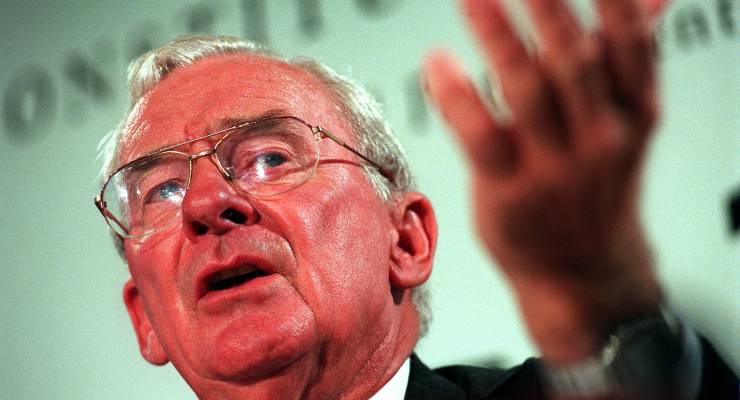
Obituaries have rightly made much of Bill Hayden’s achievements around the establishment of the forerunner of Medicare — against the ferocious opposition of the medical profession — and his giving way to Bob Hawke quickly enough in 1983 to catch Malcolm Fraser out, but it’s important to recall his central role in the modernisation of Labor.
After two smashing wins for Fraser against Gough Whitlam in 1975 and 1977, Hayden edged out Lionel Bowen to replace him. He made Labor electorally competitive again, achieving a big swing in 1980 and halving Fraser’s huge majority. His particular achievement was to assemble one of the most talented frontbenches in post-war political history: Paul Keating, Peter Walsh, Susan Ryan, John Button, Gareth Evans, John Dawkins and Ralph Willis among many others.
When he toppled Hayden in the wake of the Flinders byelection, Hawke was able to take over a formidable and competitive machine in the depths of a major recession. A drover’s dog, indeed.
Hayden’s centre-left faction proved crucial in providing support for the Hawke-Keating economic and fiscal agenda in government — in 1975, Hayden himself had steadied a badly listing ship as Whitlam’s treasurer with a well-received budget that wouldn’t pass Parliament until Fraser had been installed in Kerr’s coup.
But Hayden as foreign affairs minister also began the slow process of reorienting Australia to its region, pursuing a settlement in Cambodia — in the teeth of US opposition — and urging aid to Vietnam. And while Hawke cultivated a new generation of Chinese leaders, even boasting absurdly of a “special relationship” with Beijing, Hayden worked assiduously on relations with ASEAN.
Between Hawke, Hayden and Keating, Australia managed a foreign policy separate from, while allied to, a Republican administration in full Cold War, Empire-of-Evil mode. It says much about the US inability to understand the capacity of Australia to be allied but independent that Reagan’s CIA painted Hayden’s foreign policy positioning as part of his bitter plot to seize back the Labor leadership from Hawke.
As subsequent Australian governments demonstrated after 1996 right up until now, such positioning was indeed rare in Canberra. Hayden led the way in modernising Labor, but some lessons from his time appear to have been forgotten.








Crikey is committed to hosting lively discussions. Help us keep the conversation useful, interesting and welcoming. We aim to publish comments quickly in the interest of promoting robust conversation, but we’re a small team and we deploy filters to protect against legal risk. Occasionally your comment may be held up while we review, but we’re working as fast as we can to keep the conversation rolling.
The Crikey comment section is members-only content. Please subscribe to leave a comment.
The Crikey comment section is members-only content. Please login to leave a comment.